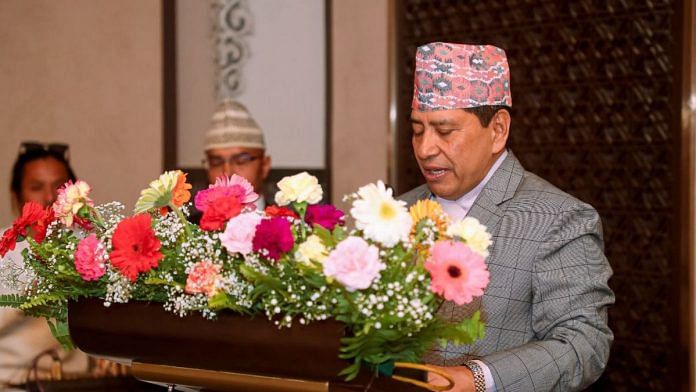New Delhi: After a major political shake-up in Nepal, the Himalayan country is reportedly on the brink of signing an implementation agreement with China on the Belt and Road Initiative (BRI) after four years of back-and-forth negotiations between Kathmandu and Beijing on investment modalities.
Local Nepalese reports indicate that Nepal Deputy Prime Minister and Foreign Minister Narayan Kaji Shrestha will travel to China next week for a five-day visit where he is scheduled to meet Chinese Foreign Minister Wang Yi and other senior officials. It is during this visit that the implementation agreement for BRI is expected to be signed. It is also likely that Shrestha will attend the Boao Forum for Asia slated for 26-29 March in China’s Hainan Province.
In January, while serving in his previous post as minister for home affairs, Shrestha had said Nepal and China will sign the BRI implementation plan “very soon”.
This comes just weeks after a major political shake-up in Nepal’s government in which Prime Minister, Pushpa Kamal Dahal (“Prachanda”) forged a new alliance with ex-premier K.P. Sharma Oli’s party, viewed as pro-China, after a falling out with the Nepali Congress.
A report in Kathmandu Post says that although the Prachanda government is yet to officially decide to sign the BRI implementation plan, there are “strong indications” that it will be a focal point during Shrestha’s upcoming visit to China. A report by Nepal Views says a draft of the agreement is “almost ready”.
ThePrint reached the Nepal Embassy in India via calls and emails for a confirmation on Shrestha’s visit. This report will be updated if and when a response is received.
It has been seven years since Nepal and China signed an MoU on BRI, back in 2017, with nine project plans in the pipeline. However, hiccups arose over financing of these projects. While the Nepalese side has been keen on only receiving grants with a view to avoid a debt trap, China is keen on providing loans.
“If Nepal and China do finalise the BRI implementation plan, it will imply that differences on financing modalities have been resolved. Either the Nepalese would have resiled from their earlier stance of grants or concessional loans only and agree to a commercial loan component as well, or the Chinese would oblige the new communist-dominated Nepalese government by sweetening their financial offers,” Ranjit Rae, former ambassador to Nepal, told ThePrint.
Any proposed Nepali-China deal would have “significant implications” for the region, he added.
There are other China-funded projects in Nepal which should raise national security concerns for India, says Nihar Nayak, Research Fellow at the Institute for Defence Studies and Analyses (IDSA).
“If the Communist government under Prachanda continues, it’s likely that other BRI projects, strategically located in Nepal, will gain ground. The proposed special economic zone in Damak region is located very close to India’s Siliguri corridor. The Trans-Himalayan Multi-dimensional Connectivity Network also involves construction of tunnels, and we are well aware that the Chinese are adept at tunnel warfare,” he told ThePrint.
Also read: 50-yr wait & $215 million debt to China — Nepal’s Pokhara Airport continues to face turbulence
Lessons from Pokhara international airport
Friction between Nepal and China on BRI was also evident with regard to disagreements over the Pokhara Regional International Airport in Nepal. Unveiled last January, the Pokhara airport is the third international airport in the country set up by Chinese state-owned company CAMC Engineering and built on Chinese loans.
On the eve of the inauguration, the Chinese Embassy in Nepal said this was a “flagship project” under BRI, causing a stir.
The Inauguration Ceremony of Pokhara International Airport will be held at 11 a.m. tomorrow. This is the flagship project of China-Nepal BRI cooperation. Warmly congratulates to Nepali Gov and Nepali people! pic.twitter.com/TEjPbE0j4b
— Spokesperson Of Chinese Embassy In Nepal (@PRCSpoxNepal) December 31, 2022
The Chinese embassy in Nepal continued to club projects in Nepal, such as the Wechat Pay Cross-board Payment Service, as part of BRI.
Warm congratulation to Wechat Pay Cross-board Payment Service Inauguration in Nepal. A new step forward in financial connectivity, one of the five "connectivities" under #BRI initiative. #DragonBoatRaceFestival2023 #DragonBoatRaceFestival#FewaLake2023 pic.twitter.com/WnvFU83uyh
— Ambassador Chen Song (@PRCAmbNepal) June 22, 2023
However, last June, then Nepal foreign minister N.P. Saud stated that Nepal is yet to execute BRI projects. Amid looming fears of a debt trap, Nepal has now undertaken diplomatic efforts with China to convert a loan for the airport project into a grant. The airport has failed to garner significant income with very few international flights since the one year of its opening, apart from Chinese chartered flights.
Asked about the possibility of Shrestha signing a BRI implementation deal with China on his upcoming visit to the country, Nepali Congress lawmaker Rajendra Bajgain told Nepali media outlet Khabarhub: “In the event it is a loan, has the [Nepali] government devised a strategy for its repayment, considering the challenges faced by Pokhara International Airport?”
Navita Srikant, an independent geopolitics and security analyst, suggests that by signing a BRI implementation deal, Nepal would signal to the world that it is “joining a geopolitical bloc”. This could adversely impact its upcoming flagship investment summit slated for late April, where the Himalayan country will be looking to attract foreign investment.
“With pending loans on Pokhara International Airport and six dysfunctional China-made aircrafts, China must prove itself a worthy partner for Nepal. BRI’s dire impact on Sri Lanka and Pakistan is well known,” she told ThePrint.
(Edited by Zinnia Ray Chaudhuri)
Also read: Why BRI isn’t taking off in Nepal—China’s mixed signals, PM Dahal’s second thoughts




The developing world needs more investments in infrastructure. The basic conception of BRI is sound. What is needed is better evaluation of economic viability, arms length award of construction contracts. Sensitivity to environmental concerns. Rates of interest are quite reasonable.